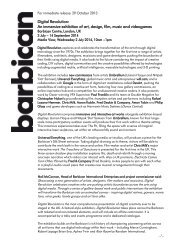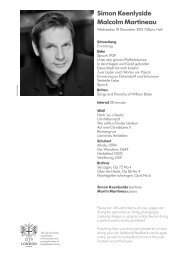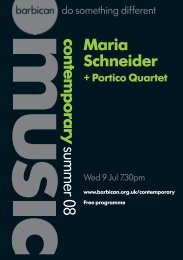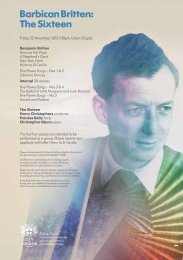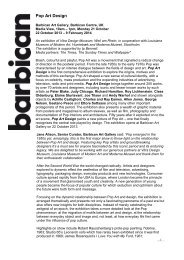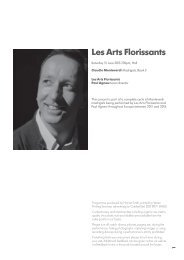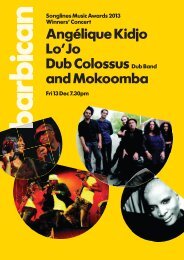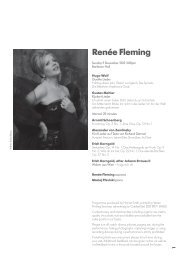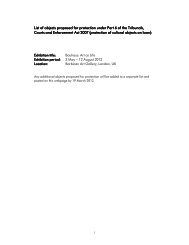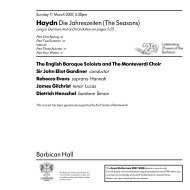Download your concert programme here - Barbican
Download your concert programme here - Barbican
Download your concert programme here - Barbican
Create successful ePaper yourself
Turn your PDF publications into a flip-book with our unique Google optimized e-Paper software.
Thursday 4 February<br />
Alban Berg (1885–1935)<br />
Three Orchestral Pieces, Op. 6 (1913–15)<br />
1 Präludium: Langsam<br />
2 Reigen: Anfangs etwas zögernd – Leicht beschwingt<br />
3 Marsch: Mässiges Marschtempo<br />
Alban Berg did not get off to a promising start. A terrible<br />
student: he had to repeat two separate years of high school<br />
before he could finally graduate. Then, too, a fling with the<br />
family’s kitchen maid led to his becoming a father at the age<br />
of 17. Though passionate about music, he was clearly not cut<br />
out for academic success, and sensibly accepted a position<br />
as an unpaid intern in the civil service.<br />
The decisive step in his eventual career arrived in the<br />
autumn of 1904, when he and Anton Webern signed up for<br />
composition lessons with Arnold Schoenberg, who had<br />
taken out a newspaper advertisement in the hope of<br />
attracting pupils. Schoenberg, who was a little more than<br />
10 years older than Berg and not yet famous, stopped<br />
offering formal classes after a year, frustrated that most of<br />
his pupils showed no aptitude for composition. However,<br />
the talented students – including both Webern and Berg –<br />
stuck with him. Schoenberg seems not to have insisted that<br />
his students adopt his own compositional methods; in<br />
the event, both Webern and Berg developed strikingly<br />
individual voices. Some years later, Webern would write<br />
of Schoenberg’s tutelage:<br />
‘People think Schoenberg teaches his own style and forces<br />
the pupil to adopt it. That is quite untrue – Schoenberg<br />
teaches no style of any kind, he preaches the use neither of<br />
old artistic resources nor of new ones … Schoenberg<br />
demands, above all, that what the pupil writes for his lessons<br />
should not consist of any old notes written down to fill out an<br />
academic form, but should be something achieved as the<br />
result of his need for self-expression. So he must, in fact,<br />
create – even in the musical examples written during the most<br />
primitive initial stages. Whatever Schoenberg explains with<br />
reference to his pupil’s work arises organically from the work<br />
itself; he never has recourse to extraneous theoretical<br />
maxims.’<br />
Berg’s formal studies with Schoenberg continued through<br />
1911. Writing to his publisher in 1911, Schoenberg remarked:<br />
‘Alban Berg is an extraordinarily gifted composer, but the<br />
state he was in when he came to me was such that his<br />
imagination apparently could not work on anything but<br />
Lieder … He was absolutely incapable of writing an<br />
instrumental movement or inventing an instrumental theme.’<br />
13




